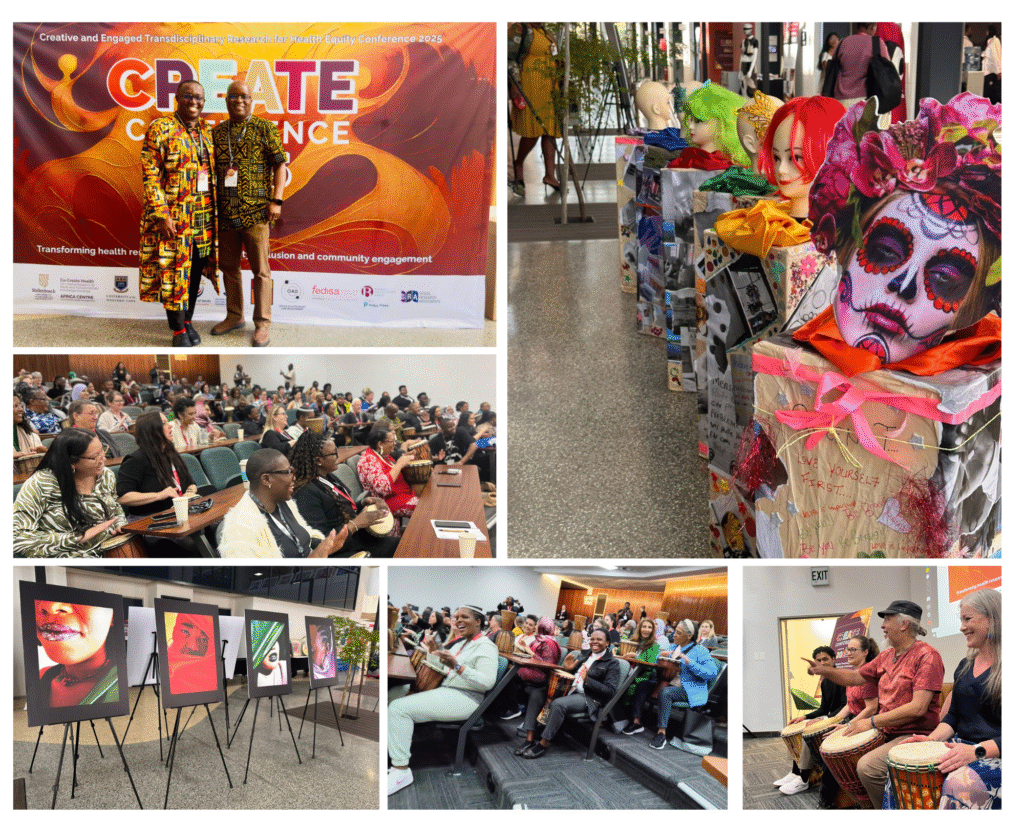
Photos from Create Conference 2025
The Collaborative and Creative Research for Equity and Transdisciplinary Knowledge Exchange (CREATE) conference 2025, hosted at Stellenbosch University’s Biomedical Research Institute, was the first convening of its kind on the continent. Guided by the theme: “Transforming health research through creativity, inclusion, and community engagement,” and over three curated days, it boldly repositioned creativity, inclusion, and community voices as essential drivers of equitable health systems in Africa.
Co-hosted by Stellenbosch University’s Faculty of Medicine and Health Sciences, the Africa Centre for Inclusive Health Management (Africa Centre), and partners from the University of the Western Cape, the University of Venda, the University of Pretoria, the University of Cape Town, KU Leuven, the Office of Astronomy for Development, and FEDISA Fashion School, CREATE 2025 offered a groundbreaking platform to rethink health research and innovation.
Breaking silos, building bridges
A core message of CREATE 2025 was clear: Health equity cannot be achieved by science alone. Lasting change emerges when disciplines, sectors, and knowledge systems intersect. To demonstrate this, the programme drew together public health experts, social scientists, indigenous healers, AI engineers, activists, designers, and storytellers.
Alongside plenaries and workshops, arts, fashion, film, and media exhibitions underscored that knowledge is not only generated in research labs but also through culture, creativity, and lived experience. As one participant reflected, “Sometimes science is more art than science.”
Youth voices and mental health
The urgency of including youth perspectives in mental health systems came through powerfully.
Conference delegate Tanya Meyer, a Wits Master’s student and volunteer at the South African Depression and Anxiety Group (SADAG), urged delegates to integrate indigenous knowledge and healing practices into mental health frameworks: “We must move beyond just the Western perspective. By including diverse perspectives, we can build a mental health support framework that truly reflects and serves our communities.”
Her call illustrated the importance of creating research and support systems that resonate with young people’s lived realities, blending Western science with indigenous wisdom.
Civil society at the heart of health systems
Civil society mobilisation was showcased by Amelia Mfiki, social activist and co-chair of the Western Cape Provincial Council on Aids & TB (PCAT). She emphasised that communities remain the backbone of South Africa’s HIV and TB response, and highlighted both persistent challenges and new opportunities, including the approval of the first dedicated civil society budget.
“Civil society is the backbone of our HIV and TB response. We must ensure structures are recognised and resourced if they are to serve our communities.” Her words underscored a CREATE 2025 theme that effective health systems cannot function without grassroots structures that connect policy to practice.
Indigenous knowledge and decolonial approaches
The Africa Centre hosted a powerful roundtable on indigenous knowledge systems and decolonial approaches for inclusive health management. Panellists reflected on the urgency of protecting traditional practices, reclaiming spirituality, and bridging Western and indigenous health systems.
Dr Jameo Calvert, president of the South African Traditional Health Practice Association (SATHPA), reminded delegates that indigenous healing is both experiential and scientific: “Indigenous health is science. I know it works, I have lived it, now we must regulate and educate on our own terms.”
Indigenous healer Zukiswa Sentse offered a deeply personal testimony, stressing that healing is a sacred calling: “You cannot copy or fake your way into becoming a sangoma. It’s a gift from birth, and there’s a process to follow.” These insights reinforced CREATE 2025’s vision of valuing multiple ways of knowing as central to inclusive health management.
Towards inclusive health for Africa
CREATE 2025 concluded with a strong call to action: Inclusive health in Africa requires collaboration, respect, and recognition of diverse knowledge systems. The event aligned with the United Nations’ Sustainable Development Goals (SDGs) — from good health and wellbeing (SDG 3) to gender equality (SDG 5), reduced inequalities (SDG 10), climate action (SDG 13), and partnerships for the goals (SDG 17).
Closing the Africa Centre’s roundtable, Dr Munya Saruchera framed the challenge ahead: “This is about respect, ethics, and the future of indigenous knowledge in research. If we are to build inclusive health systems, we must bring in different ways of knowing and ensure that engagement with communities is always ethical and respectful.”
